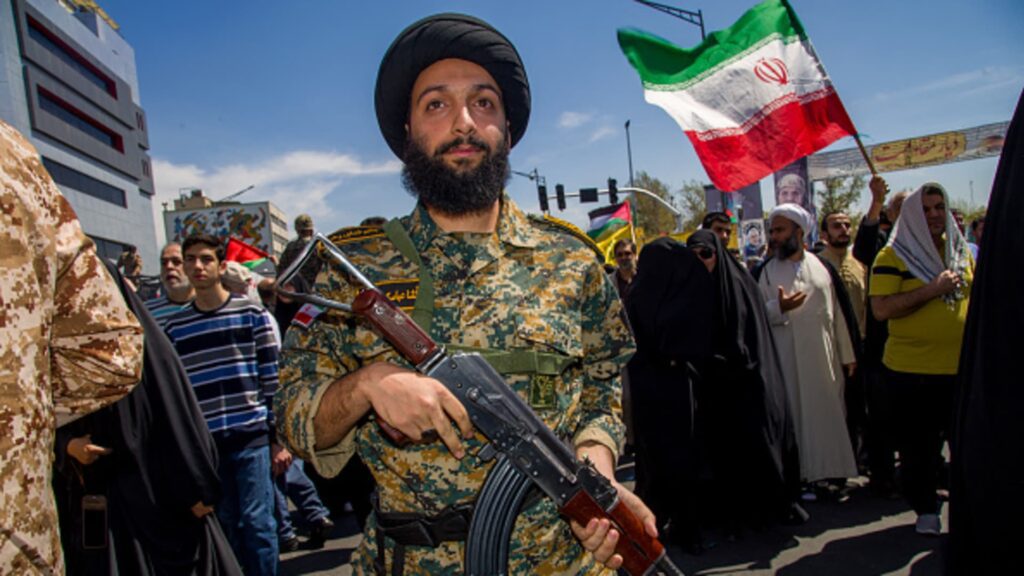Iranians attend a funeral in Tehran, held for seven members of the Islamic Revolutionary Guard Corps who were killed in an air strike in Syria.
Hussein Peres | AFP | Getty Images
Western diplomats have intensified pressure on China to prevent Iran from escalating tensions in the Middle East by launching a direct retaliatory strike against Israel.
US Secretary of State Antony Blinken spoke earlier this week with Chinese Foreign Minister Wang Yi and other counterparts in Turkey and Saudi Arabia amid growing fears of Tehran's retaliation against Israel.
US State Department spokesman Matthew Miller said Thursday that Blinken asked the foreign ministers to “make clear that escalation is not in anyone's interest, and that countries must urge Iran not to escalate.”
He added: “We have also communicated with European allies and partners over the past few days and also urged them to send a clear message to Iran that escalation is not in Iran's interest, not in the region's interest, and not in the world's interest.” “
Germany, whose Chancellor Olaf Scholz is visiting China next week, is also in contact with Beijing on the Iran issue, where China has influence, according to a report published by Reuters on Friday, citing German officials.
American and European officials are treading a fine line with China, denouncing China as a trade risk while also urging it to use its considerable diplomatic influence with countries isolated by Western sanctions.
Beijing is an important trading partner of Russia and Iran as one of the last beneficiaries of their oil exports. The three countries are also members of the China-led BRICS emerging markets alliance.
Iran responds
Israel's war against the Tehran-backed Palestinian movement Hamas began in October, after a terrorist attack carried out by the armed group. Israel has also exchanged strikes with factions in Lebanon, Yemen, and Syria, which it considers to be agents of Iran.
Washington, a close ally of Israel, has repeatedly warned Tehran against interfering in the conflict in the Gaza Strip.
For its part, Tehran insists that it does not direct armed groups in its attacks, but it previously praised the terrorist attack carried out by Hamas on October 7.
Tensions escalated at the beginning of this month, when seven Iranian military advisers, including senior officials, were killed in a suspected Israeli raid on the Iranian consulate in the Syrian capital, Damascus, on April 1. Israel did not claim responsibility for the incident.
Iranian leader Ayatollah Ali Khamenei said on Wednesday that Israel “must and will be punished” for the killings in Damascus.
“The consulates and embassies of any country are considered the soil of that country. When they attack our consulate, it means they attacked our territory,” Rouhani was quoted as saying by the state-owned IRNA news agency.
In a clear response, Israeli Foreign Minister Israel Katz said that day: “If you attack Iran from its territory – Israel will respond and attack in Iran,” according to a Google translation.
The foreign ministers of the United Kingdom and Australia on Thursday urged Iran not to deepen the conflict.
“I made it clear today to the Foreign Minister [Hossein] “Iran must not drag the Middle East into a broader conflict. I am deeply concerned about the potential for miscalculation leading to further violence,” British Foreign Secretary David Cameron said Thursday on social media.
Australian Minister Penny Wong said she urged Iran to “use its influence in the region to promote stability.”
Amir Abdullahian noted that he also spoke with German Foreign Minister Annalena Baerbock and responded to his three counterparts on social media.
He said that when “Israel tramples on international law and the Vienna Conventions and violates the immunity of representatives, diplomatic buildings, and the UN Security Council, [UN Security Council] “If he is unable to issue a statement condemning the terrorist attack on the Iranian embassy in Damascus, then a legitimate defense aimed at punishing the aggressor becomes a necessity.”
The Israeli Foreign Ministry did not immediately respond to a request for comment on the statement.
“Iron” relationships.
Any direct attack by Iran on Israeli territory would likely increase the international impact of the conflict in Gaza, which has spilled over into markets via rising oil prices and trade disruption caused by Yemeni attacks in the Red Sea.
The IDF, the Israeli Foreign Ministry and the US State Department did not immediately respond to CNBC's requests for comment on the possibility of such an attack – which risks an Israeli response.
Israeli Prime Minister Benjamin Netanyahu said after a visit to Israel, “We have set a simple rule: whoever harms us, we will harm him. We are ready to meet all the security needs of the State of Israel, both defensively and offensively.” Tel Nof Air Base, according to statements issued by his office on Thursday.
Washington expressed its solidarity with Israel, although support appeared to have waned slightly after Israeli raids killed seven humanitarian relief workers in the Gaza Strip, which Israel later described as a “terrible mistake.”
US President Joe Biden said Thursday that Iran “threatens to launch a major and major attack on Israel.”
He added: “As I told Prime Minister Netanyahu, our commitment to Israel's security against these threats from Iran and its proxies is strict.”
